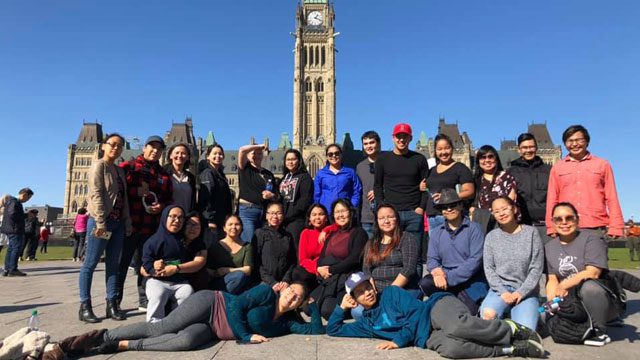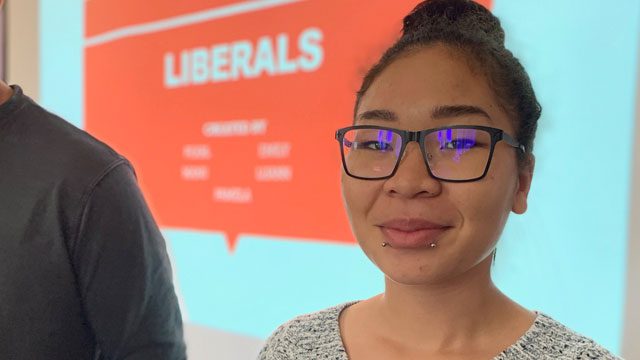On Rideau Street in Ottawa there is a little bit of Nunavut hidden away.
It’s called Nunavut Sivuniksavut (NS), a place that’s been preparing high school graduates for post-secondary education for more than 20 years.
Here, students analyze the Nunavut Agreement – the land claim that founded northern territory – and the skills they learn get them ready for a higher academic level.
The program works, if you judge it by its graduates.
Stacey Aglok McDonald graduated in 2003, and went on to become the producer for the ground-breaking, made-in-Nunavut film The Grizzlies.
In addition to representing Inuit youth through the Qikiqtani Inuit Association, 2006 graduate Anguti Johnston went on to star in and produce APTN’s Qanurli show, which uses humour to teach Inuktitut language skills.
Other graduates have become territorial cabinet ministers and mayors.
This year’s class had a special opportunity to study the Canada-Nunavut relationship through the lens of a federal election. [With more than 95 per cent of Nunavut’s funding coming from the federal government, federal elections are important to Nunavut.]

When APTN visited, students were breaking down the federal platforms, trying to discover exactly what the promises would mean for Nunavummiut.
Kobe Akyakanavigak – yes, Kobe, like the basketball player – is from Cambridge Bay but has a Los Angeles Lakers backpack with him at school.
He turns 18 just days before the election and is trying to secure a remote ballot to cast his first-ever vote.
“The only way that you can change society, in a permanent way, is to vote,” says Akyakanavigak.
“If you don’t vote, you don’t have the right to complain.”

Kobe Akyakanavigak thinks the most important issues for Inuit this election are mental health and housing (Kent Driscoll/APTN).
The students were too clever to reveal who they were voting for, but when asked about Liberal Leader Justin Trudeau’s recent campaign visit to Iqaluit, Akyakanavigak was not moved.
“I was so mad. I was hoping that the communities would kick him out,” he says.
“That’s how I truly felt; I honestly thought that they would, because he hasn’t fulfilled any of the promises that he said he was.”
Akyakanavigak wants to see federal promises equal federal action when it comes to housing and mental health issues.
“Nothing has changed in Nunavut, the issues are still the same,” he says.
“We try to bring it up but they won’t listen.”
Lily Parr had to fight for her education.
When the Peter Pitseolak School in her hometown of Cape Dorset burned down by arson, she transferred to Ontario for her Grade 12 year.
She wasn’t willing to sit through a year of split shifts and over-crowding. From there, she qualified for NS.
She watched the English-language leaders’ debate and wondered where was the Inuit content?

Climate change is a big issue for Pearl Howard in the general election (Kent Driscoll/APTN).
“I heard Indigenous, but when they were talking about the issues, I was disappointed, because all they talked about was pipelines,” says Parr, a first-time voter.
“I wish they were also talking about the unique challenges we face up North, which are food security, high cost of living and the housing crisis. That was very disappointing, and I wish that they can bring more attention to it.”
Part of going to NS is marching on Parliament Hill.
Annually, students gather to support the seal hunt and Inuit seal hunters to show mainstream society why the mammal is so vital to Inuit.
This year, NS students took part in the national climate change marches.
Pearl Howard was born in Rankin Inlet, but calls Cambridge Bay home. Marching on the Hill was a highlight for her.
“For centuries now, Inuit have been travelling, from community to community, from Nunavut to Greenland, through ice. And with climate change happening so fast, it’s getting harder and harder for Inuit to do that,” she says.
Howard will have the memory of her march for the rest of her life because no one ever forgets their first big protest.
“It was amazing, and to be a part of something so big, in the capital of Canada, it made me feel proud to be who I am as an Inuk and from Nunavut,” she said, beaming.
In these classrooms, Nunavut’s future leaders are watching, questioning and learning through this federal election.
They are part of Canada’s youngest and fastest-growing population.
Soon, they’ll return to their home communities or continue on to more education.
It sounds like they’re going to be sorely needed.










I love what they have been doing in getting the youth ready for TOMORROW